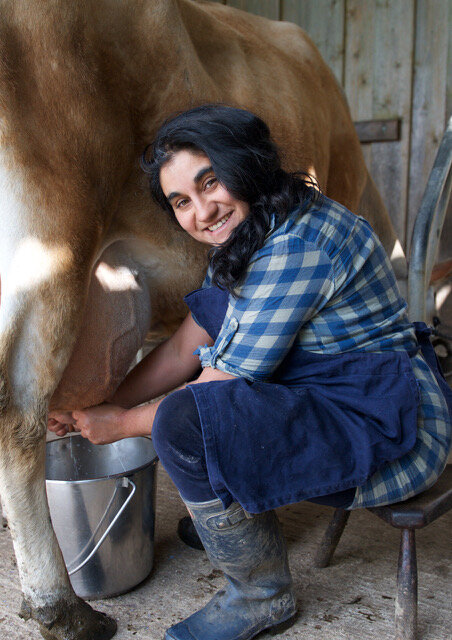Growing Roots in the Heart of the Empire
The Agroecology Fund recently collaborated with A Growing Culture on five episodes of their Hunger For Justice Series. Launched to highlight the inequities of the industrial food system exposed by Covid-19, these live broadcasts featured agroecology leaders from the AEF grantee network, and sought to amplify their grassroots community-led solutions for resilience.
“The series is a chance to pull people with an environmental focus into the social aspect of the food movement. A lot of the people tuning in are familiar with regenerative agriculture and sustainability but not food sovereignty and agroecology,” says A Growing Culture’s Loren Cardeli.
On August 14, the series featured AEF grantee partner the Landworkers’ Alliance. Dee Woods and Jyoti Fernandes shared their vision on building a decolonized food system, and discussed their fight for food sovereignty in the UK with Saulo Araujo from Why Hunger.
The United Kingdom has a long history of dispossession and land injustice. Since the 13th century, the process of Enclosures consolidated small landholdings into larger plots, pushing peasants off the land and restricting communal use. Access to land remains starkly unequal, with ownership concentrated in the hands of a few wealthy white individuals and families. 1% of the population own more than 50% of the land in England alone. “It’s almost impossible to access land for farming, if you don’t come from a farming family or if you don’t have access to resources,” said Dee Woods, a food and farming activist who advocates for a just, equitable food system as director of the Landworkers’ Alliance.
The Landworkers’ Alliance is a union of more than 1200 small farmers, foresters and fisherpeople who have come together to fight against these injustices, challenging the systemic barriers that impact marginalized communities and food producers. Those seeking to reconnect and lay down “deep roots” to the land, to access healthy, affordable food have many barriers to overcome, said Dee. Just as small-scale farmers and would-be farmers are struggling, more than 8 million people in the UK remain food insecure.
“The narrative of food and farming is incredibly dominated by large landowners. We’re fighting for more support for small-scale producers, especially women, and people of color,” explained Jyoti Fernandes, a smallholder farmer in Dorset and campaigns coordinator at Landworkers’ Alliance.
The Landworkers’ Alliance promotes agroecology and food sovereignty, and urges the government to adopt public procurement policies to support local producers, enabling them to supply schools, hospitals and prisons with healthy, agroecologically grown food.
To circumvent the dominant supermarket and food bank model, which fails to address structural inequities, the Landworkers Alliance has built alternatives, from cooperatives to peri-urban farms to community kitchens to solidarity CSAs to directly supply consumers. “This is what our subsidies should be geared towards, not to support industrial farming and multinational corporations,” said Jyoti.
Food policy for the people
At the country’s first solidarity Community-Supported Agriculture (CSA) program at Granville Community Kitchen in northwest London, people can buy a share in the CSA so someone with a low income can benefit from a healthy produce bag of fruit, vegetables and milk. This supports the food insecure in urban areas and also local farmer networks, said Dee. Their efforts to create a resilient localized food economy in an underserved community stem from the firm belief that food is a human right.
“Everyone has a right to good food...fresh, nutrient-dense, culturally acceptable food, from agroecological farms, where the farmers and producers have fair working conditions and remuneration,” said Dee.
The Landworkers’ Alliance has been pivotal in creating a People’s Food Policy, a proposal for a national food strategy. “Unfortunately we are still stuck in an imperial mindset where food is considered a commodity, but food is so much more. This is the biggest barrier: to get people to realize that real food comes from our farmers and fisherfolk; it’s not the highly processed products of agribusiness that is killing people and killing our planet,” said Dee.
“It’s not enough to speak to the most powerful people in the House of Lords, we need to talk with each other. The groundswell of public opinion is important,” said Jyoti. Through their campaigns and creative advocacy strategies, they’re making sure they’re reaching the wider community, not just within the UK but internationally as well.
The UK’s food, development, and aid strategies still stem from a largely colonialist mindset, forcing the liberalization of poor countries’ economies and importing commodities from around the world, said Jyoti.
As part of the La Via Campesina network, the members of the Landworkers’ Alliance have shouldered a responsibility not just to fight for land justice in the UK, but also to shape policies so that “the impact of the Global North is something to be proud of, rather than something that is destructive and extractive,” said Jyoti. The Alliance continues to seek reparations for the legacy of colonialism in UK trade and development policy, and fights for climate, land and food justice.
Watch the full recording on YouTube:
Learn more about AEF’s Emergency Fund grantees here.
Photographs courtesy The Landworkers’ Alliance.




